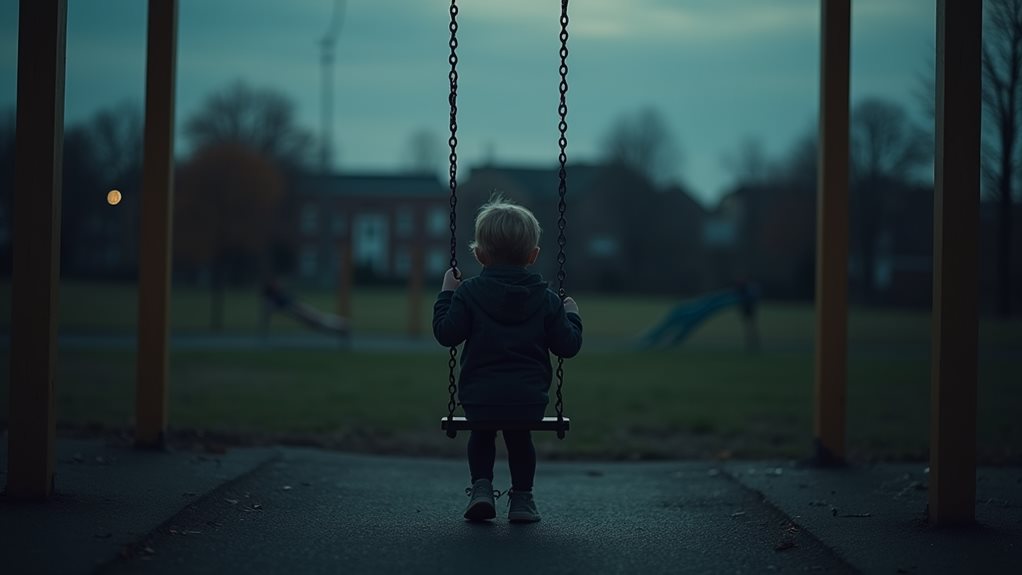
Childhood trauma often predisposes you to addiction as early emotional wounds disrupt your natural stress and emotional management systems. When your family dynamics force rigid roles or poor communication, it might lead you to seek comfort in substances like alcohol, perpetuating a cycle of addiction coupled with coping mechanisms. By understanding these links and actively engaging in therapeutic approaches, you'll be better equipped to address these underlying issues and foster recovery. Learn more about transformative therapeutic resources and strategies that can support your journey.
Key Takeaways
- Childhood trauma often leads to emotional symptoms like numbness and dysregulation, pushing individuals towards substance use as a coping mechanism.
- Dysfunctional family dynamics and rigid roles in childhood can increase dependency on substances in adulthood to manage stress and emotions.
- The cycle of addiction is reinforced by trauma's impact on the brain's reward system, making substances more appealing for emotional regulation.
- Early traumatic experiences disrupt attachment styles and trust, fostering behaviors such as aggression or withdrawal, which complicate adult relationships and can lead to substance abuse.
- Integrated therapeutic approaches focusing on underlying trauma are essential for effectively breaking the cycle of addiction and promoting long-term recovery.
The Role of Family Dynamics in Childhood Trauma
While family dynamics play an essential role in the development of childhood trauma, it's particularly evident in homes where alcohol addiction is prevalent.
In these settings, disrupted family roles and unhealthy communication patterns contribute considerably. You'll often find rigid roles assigned to each family member, forcing children into caretaking or peacemaking positions prematurely. This role confusion can hinder your emotional development and stress management skills.
Furthermore, unpredictable communication filled with contradictions and emotional volatility creates a lack of secure attachment, escalating your anxiety and confusion.
Understanding these dynamics is vital to addressing the root causes of trauma and fostering healthier relational patterns.
Emotional Symptoms and Their Long-Term Effects
If you've experienced childhood trauma, particularly in homes marked by alcoholism, you may frequently encounter emotional symptoms such as numbness, guilt, and shame. These reactions often stem from enduring childhood shame and emotional dysregulation.
| Emotional Symptom | Long-term Effect |
|---|---|
| Numbness | Detachment from emotions |
| Guilt | Persistent self-blame |
| Shame | Low self-esteem |
| Emotional Dysregulation | Anxiety and Depression |
Living with these symptoms can severely impact your daily life and relationships. It's vital to recognize these patterns and seek therapeutic support to mitigate their effects and foster emotional resilience.
The Cycle of Addiction as a Response to Trauma

Understanding the cycle of addiction as a response to trauma requires recognizing that many individuals turn to substances like alcohol as a means of self-medication. This often starts with an attempt to manage overwhelming trauma responses.
Over time, these initial coping strategies can evolve into entrenched addiction cycles. Clinically, it's observed that trauma deeply impacts the brain's reward system, altering stress responses and emotional regulation.
This biochemical shift makes substances more appealing and habit-forming, perpetuating the cycle. Breaking this cycle necessitates addressing the underlying trauma, not just the addiction, highlighting the importance of integrated therapeutic approaches that focus on both aspects.
Behavioral Patterns Stemming From Early Experiences
Recognizing the cycle of addiction highlights the significance of addressing underlying trauma to break this destructive pattern.
Your early experiences, marked by emotional dysregulation and unstable attachment styles, often set the stage for later behavioral patterns. Studies show that children who experience inconsistent caregiving can develop coping mechanisms that may include substance use as an adult.
This adaptation to emotional chaos promotes patterns of aggression or withdrawal in relationships, reflecting deep-seated trust issues. Understanding these links is essential.
It's not just about treating addiction but healing the emotional wounds that fuel these behaviors, vital for breaking the cycle effectively.
Mindfulness and Other Coping Strategies for Healing

While exploring effective healing strategies, it's crucial to take into account mindfulness as a powerful tool for individuals recovering from childhood trauma.
Mindfulness meditation has shown significant empirical support in reducing symptoms of anxiety and depression, common in those with such pasts. By focusing on the present moment and acknowledging thoughts without judgment, you can break patterns of negative self-critique stemming from earlier trauma.
Additionally, integrating creative expression into your routine provides a non-verbal outlet for complex emotions, facilitating deeper healing.
These approaches promote a recalibration of your emotional responses, helping you manage triggers more effectively and fostering long-term emotional resilience.
The Importance of a Supportive Network in Recovery
Although recovering from childhood trauma is a deeply personal journey, having a strong support network greatly enhances the healing process. Supportive relationships and community engagement are critical, providing:
- Emotional validation and shared experiences that reduce isolation.
- Opportunities for social connections that reinforce positive behaviors.
- A sense of belonging that boosts self-esteem and resilience.
- Access to resources and guidance from individuals who understand the recovery path.
Empirical evidence suggests that these networks not only promote sustained recovery but also improve overall mental health outcomes.
Engaging with a supportive network can empower you to navigate the complexities of healing from trauma more effectively.
Transformative Therapeutic Approaches and Resources

To effectively address the deep-seated issues stemming from childhood trauma, it's essential to explore transformative therapeutic approaches and resources.
Engaging in evidence-based transformative therapies such as trauma-focused cognitive behavioral therapy (TF-CBT) and eye movement desensitization and reprocessing (EMDR) can greatly alleviate symptoms by restructuring maladaptive beliefs and processing traumatic memories.
Additionally, integrating healing resources like support groups and holistic practices enhances resilience and emotional regulation.
These methods, when tailored to your specific experiences and symptoms, foster a path to recovery that's both sustainable and empowering, ultimately transforming trauma-induced patterns into opportunities for profound personal growth and healing.
Frequently Asked Questions
How Does Childhood Trauma Affect Physical Health in Adulthood?
Childhood trauma disrupts your emotional regulation, which can lead to chronic illnesses. Poorly managed stress affects your immune system, increasing your risk for conditions like heart disease and diabetes in adulthood.
Can Childhood Trauma Influence Career Choices and Job Performance?
You may find that childhood trauma influences your career choices and job performance, potentially affecting long-term career impact and job satisfaction through struggles with trust, emotional regulation, and coping mechanisms in professional settings.
What Role Do Genetics Play in Trauma Responsiveness?
Genetics weave a complex tapestry in your trauma resilience, with genetic predisposition playing a pivotal role. They shape how you respond to stress, potentially enhancing or undermining your ability to navigate traumatic events effectively.
How Can Schools Better Support Children Experiencing Trauma?
To better support you, schools should adopt trauma-informed practices, ensuring educators are trained to offer consistent emotional support and recognize signs of distress, promoting a stable and understanding environment conducive to your learning and well-being.
What Are Legal Protections for Children Facing Trauma at Home?
You're protected under child welfare laws that mandate reporting and intervention in cases of trauma. Trauma legislation also guarantees access to necessary therapies and support systems, aiming to safeguard your emotional and physical well-being.
Conclusion
Imagine yourself standing at the edge of a serene lake, the early morning mist clearing as the sun rises, symbolizing your journey toward healing. The turbulent waters of your past, stirred by childhood trauma, gradually calm as you employ mindfulness and lean on supportive networks. Each step towards understanding the roots of your addiction through therapy and coping strategies mirrors the soothing, rippling water—ushering in a new dawn of resilience and recovery.





